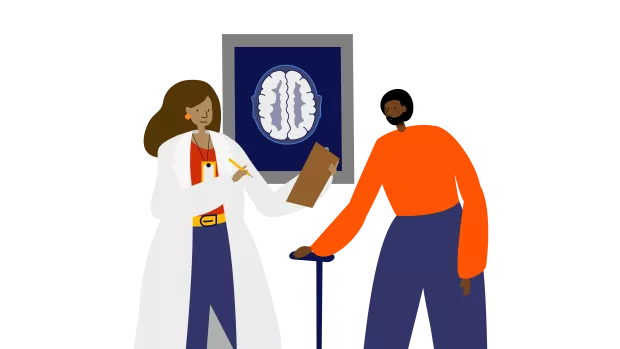
Living with progressive MS: Diet and dietitians
Specialist neurology dietitian Farah Suleman explains what we know about diet and progressive MS – and how a dietitian can help if you want to make changes.
If you’re living with progressive MS, you might feel a lot of things are out of your control. The food you choose can help give back a bit of control in how you manage your MS. It’s a ‘lifestyle choice’ that can make a difference.
But I know it’s a choice sometimes affected by how much food costs, or how it’s prepared. A dietitian like me can help you find what works best for you.
Diet is one of several things that might each make a positive difference – like exercise or managing stress. Few of us follow our plans perfectly for these kind of things, but we can still feel improvements when we manage even small changes.
And we know that eating well can really be a key factor in feeling well in yourself. Not just in managing MS symptoms, but also your mental health and wellbeing. Lots of people with MS say when they “eat better they feel better”.
What does the science say about diet and progressive MS?
As research progresses, we continue to learn more about the role of diet to manage MS. At the moment we don’t know of a specific ‘special’ diet which will slow down the progression of MS.
A healthy weight
We do know that eating a healthy balanced diet can help to maintain a healthy weight. And many research studies are showing that people who are obese may have an increased risk for MS-related disability.
The gut microbiome
There’s also some research suggesting the type and health of bacteria in your gut, known as the ’gut microbiome’, might affect MS and its progression. Unfortunately, at the moment we don’t know how – or how much - we might be able to affect this through diet.
Vitamin D
Low vitamin D levels have been linked with increased disability in people with MS. It's useful to speak to your MS team about taking vitamin D supplements and getting the right levels for you. Vitamin D is found in a few foods including oily fish, liver and egg yolks. But it’s hard to get enough from what we eat. It’s also formed from sunlight on our skin. But we get less of that in winter, or if your skin is more covered up.
Diet research is complicated
Diet is a tricky area to research, and how diet affects our health is complicated. If you do want to find out more about your diet and MS, and the newer research, it’s always worth speaking to a dietitian. They can make sure all the advice given is scientific and has enough evidence to back it up.
Is there a diet for progressive MS?
Some people do follow specific diets, but there isn’t a special diet that I’d recommend for everyone with progressive MS.
You may have heard of or read on the internet about specialist diets for MS, which can include Paleo diets, keto diet, the Swank Diet to name a few. There’s no clear evidence to recommend these for everyone with MS. But if you want to follow a diet, it’s worth discussing it with a dietitian. We can help make sure you don’t miss out on any key nutrients.
Diet advice is individual
If you’re fairly mobile, often the best advice we can provide is to have a varied, balanced diet combined with exercise. Eating this way can also help you to:
- maintain a healthy weight
- feel less tired and manage fatigue better
- have regular bowels and toilet habits (bowel and bladder)
- keep your skin, teeth, gums and bones in good condition
- improve muscle strength and muscle function
- reduce the risk of certain diseases like heart disease, stroke, osteoporosis and certain cancers
If you’re less active than you once were, you might find you’re gaining weight. And some drug treatments can also lead to weight gain. We can help you manage this.
If you are losing weight when you don’t want to, or have a poor appetite, a dietitian can help. We’ll look at ways to increase the nutrients in your diet. We might suggest supplements to increase the calories or protein you’re having. Dietitians may work alongside a speech and language therapist too, to advise about altered textured foods if you have swallowing difficulties.
Help with MS symptoms
If you experience problems with posture, swallowing, fatigue or tremor, these can all make shopping for, preparing or eating food more difficult. A dietitian can help you find solutions such as choosing foods that are easier to swallow. But we might also refer you to an occupational therapist as well. For example, they can help with weighted cutlery to help with tremor, or non-slip mats.
How do I know when I should see a dietitian?
You know your body best and what feels right for you. But a dietitian could support you if you notice:
- any changes in how you’d normally eat and drink. That could include changes in your appetite or in the way you chew and swallow food
- any changes in your weight including weight loss or weight gain
- your diet is more restricted for any reason
The NICE guidelines for managing MS say that people with MS should be able to get advice from a dietitian if it will help them manage their MS. But we do know that each MS service is very varied and will have different procedures.
So if you’re not referred automatically, it’s worth speaking to your MS nurse, neurologist or GP if you feel a dietitian would help you.


